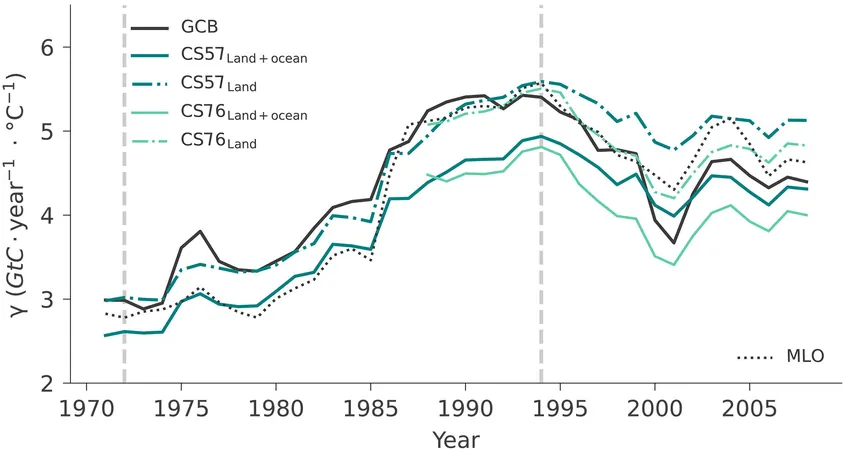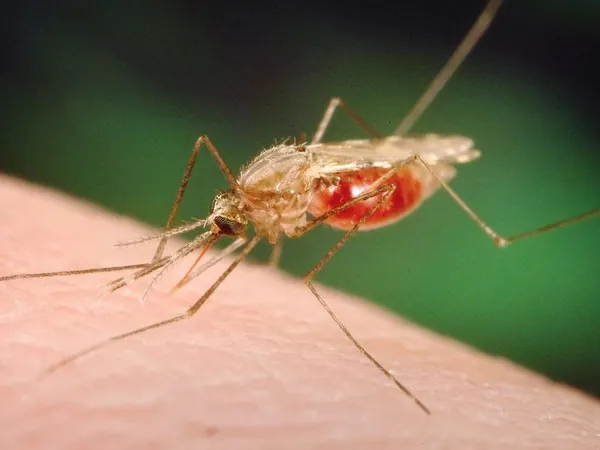
Shocking Discovery: El Niño Events Cause Unprecedented CO₂ Fluctuations!
2024-09-27
Groundbreaking Study Reveals New Insights into CO₂ Sensitivity
A groundbreaking study has overturned long-held beliefs regarding the relationship between carbon dioxide (CO₂) levels in our atmosphere and tropical temperatures. Researchers from the Max Planck Institute for Biogeochemistry and Leipzig University have revealed that from 1959 to 2011, the atmospheric CO₂ levels were significantly more responsive—twice as sensitive—to tropical temperatures than previously understood.
The Role of Extreme El Niño Events
While many scientists attributed this newfound sensitivity to the intensifying drought conditions and shifts in carbon cycles due to climate change, this latest research pinpoints a surprising culprit: a few extreme El Niño events. These events, notorious for the extreme weather they bring—think harsh droughts and punishing heat waves—have had a profound effect on plant growth and carbon absorption.
Significant Findings from the Research
The study, published in the highly regarded journal *Science Advances*, sheds light on how both tropical and non-tropical ecosystems absorb vast amounts of CO₂ that stem from human activities. Globally, it is estimated that terrestrial ecosystems act as a natural buffer, absorbing approximately one-third of humanity’s CO₂ emissions. However, during the extreme El Niño events of 1982/83 and 1997/98, the dynamics shifted dramatically, leading to a significant release of carbon by vegetation during these critical periods.
Implications on Future Climate Projections
The researchers discovered that the increased frequency of these extreme El Niño events since the 1980s has driven up the sensitivity of global carbon storage fluctuations, raising important questions about future climate projections. Na Li, a key researcher on the study, assures us, “Our findings indicate that this heightened sensitivity may not signify a permanent shift in the carbon cycle but rather is tied to extreme weather events.”
Understanding Ecosystem Dynamics
The term “slow-in, fast-out” aptly describes how ecosystems operate within the carbon cycle: while carbon is absorbed gradually, extreme events lead to rapid releases, adding to atmospheric CO₂ levels and complicating climate predictions.
Call for Improved Climate Models
Dr. Sebastian Sippel from Leipzig University warns that these fluctuations highlight uncertainties in our climate models. “To effectively predict future climate scenarios, we must enhance our understanding of how extreme phenomena like El Niño influence carbon dynamics,” he emphasizes.
Conclusion and Future Directions
This monumental study not only challenges previous narratives surrounding climate change but also encourages a re-evaluation of how we perceive environmental reactions to extreme weather. As scientists continue to unveil the mysteries of climate interactions, one thing is clear: our understanding of the carbon cycle—and its future implications—needs a drastic rethink.
Stay tuned as we follow this evolving story, which could reshape the way we tackle global climate challenges!









 Brasil (PT)
Brasil (PT)
 Canada (EN)
Canada (EN)
 Chile (ES)
Chile (ES)
 España (ES)
España (ES)
 France (FR)
France (FR)
 Hong Kong (EN)
Hong Kong (EN)
 Italia (IT)
Italia (IT)
 日本 (JA)
日本 (JA)
 Magyarország (HU)
Magyarország (HU)
 Norge (NO)
Norge (NO)
 Polska (PL)
Polska (PL)
 Schweiz (DE)
Schweiz (DE)
 Singapore (EN)
Singapore (EN)
 Sverige (SV)
Sverige (SV)
 Suomi (FI)
Suomi (FI)
 Türkiye (TR)
Türkiye (TR)